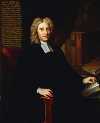 Clarke was an English philosopher and clergyman who advocated the theories of Isaac Newton. Clarke maintained that ethical law is as constant as mathematical law. His published works include many translations, lectures, sermons, and commentaries. In 1717, his correspondence with German philosopher Gottfried Leibniz was published. In it, he argues with Leibniz in defense of the existence of absolute space—physical space independent of what occupies it. Why did their discussion abruptly end? Discuss
Clarke was an English philosopher and clergyman who advocated the theories of Isaac Newton. Clarke maintained that ethical law is as constant as mathematical law. His published works include many translations, lectures, sermons, and commentaries. In 1717, his correspondence with German philosopher Gottfried Leibniz was published. In it, he argues with Leibniz in defense of the existence of absolute space—physical space independent of what occupies it. Why did their discussion abruptly end? Discuss
Source: The Free Dictionary